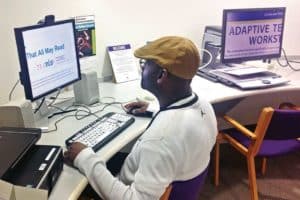On March 15, the Marrakesh Treaty Implementation Act (S. 2559) was introduced in the US Senate, nudging the United States further toward adoption of the Marrakesh Treaty. The international copyright treaty provides a copyright exception—the first ever in an international treaty—for libraries as authorized entities to make copies of entire articles and books accessible for people with print disabilities and distribute those copies across borders.
If the Marrakesh Treaty Implementation Act is passed and signed by the president, the bill will greatly increase access for English speakers with print disabilities, especially in developing countries, where less than 1% of all published print content is accessible. The US will benefit as well by being able to obtain foreign-language content, especially for Spanish speakers with print disabilities.
The American Library Association (ALA) first became involved in advocating for an exception for the print-disabled back in 2008, when ALA’s Washington Office collaborated with the Library Copyright Alliance (LCA), which includes the Association of College and Research Libraries (ACRL) and the Association of Research Libraries (ARL), to apply for and be granted official nongovernmental status to attend and make position statements at World Intellectual Property Organization meetings. For the next five years, LCA provided input to the US delegation and partnered on advocacy efforts with the International Federation of Library Associations and Institutions, World Blind Union, National Federation of the Blind (NFB), and other associations for people with print disabilities. When the treaty was adopted in 2013 at an international diplomatic conference in Marrakesh, it was hailed as the “Miracle in Marrakesh.”
Signing the treaty was only the first step. Because ratification and adoption of the treaty in the US requires modest changes to the US copyright law, copyright policy stakeholders, including the LCA, NFB, and American Association of Publishers (AAP), met to reach consensus on legislative language, extending the process another five years.
Now that the Marrakesh Treaty Implementation Act has been introduced, the next step toward full adoption of the treaty involves advocating to ensure swift passage of the legislation. Senators need to hear from constituents that the treaty is a priority. Contact your senator and show your support for the Marrakesh Treaty Implementation Act at the ALA Action Center.

